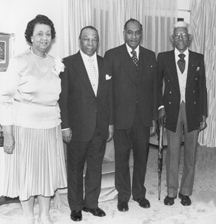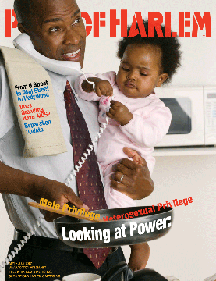In November 2020, Port Of Harlem will celebrate 25 years of publication. As we count down to our birthday, we will republish some of our most popular articles from our print issues. Thanks for subscribing and inviting others to join you in supporting our inclusive, diverse, pan-African publication - - now completely online. We originally published this article in the May-July 2007 print issue
It was 1941 and Coretta Scott was in the eighth grade when a northern Black man came to Alabama and spoke to Scott’s class about India’s use of nonviolence to free itself from British colonialism. She would hear this man speak again on nonviolence while attending college in Ohio. According to Jervis Anderson, in “Bayard Rustin: Trouble I’ve Seen,” when this man came to Montgomery to advise Martin Luther King, Jr. on using the tactic during the Montgomery bus boycott Coretta Scott King (then married to Martin) greeted him at the door by saying, “I know you, Mr. Rustin.”
Between the first Chicago student sit-ins in 1942 and the passage of the Civil Rights and Voting Rights Acts in 1964 and 1965, Bayard Rustin had a hand in nearly every major nonviolent civil rights activity in the United States. His grandmother was the first to set in motion his passion for achieving justice non-violently. His family members were Quakers. It is a Quaker tradition to do no violence to others and to respect all people.
Bayard Rustin: Defying the Odds
Praising the Past




He lived with “unrespectable” baggage in a world that often oppresses people who carry such. His mother, young and not married when he was born, allowed his grandparents to raise him as if his mother was his sister. He was left handed during a period when teachers compelled left-handed students to write with their right hand. Rustin, a talented musician, singer, and athlete supported New York Governor Al Smith, a Catholic, in his failed run for the Democratic presidential nomination. During the race he learned that Protestants were prejudiced against Smith’s religion.
Despite his "baggage," the march leaders did not relent and chose Rustin to organize the march where the late John Lewis was the youngest speaker and Dr. King delivered his now famous, "I Have a Dream" speech.
Rustin was high school valedictorian and attended Wilberforce University where he experienced his first same-sex relationship. “We never had any physical relationship, but a very intense, friendly relationship. At that point, I knew exactly what was going on,” he said. He was asked to leave Wilberforce after he organized a student strike for better food. He never finished college and while living in Harlem he joined the Communist Party.
Read More
Despite his "baggage," the march leaders did not relent and chose Rustin to organize the march where the late John Lewis was the youngest speaker and Dr. King delivered his now famous, "I Have a Dream" speech.
Rustin was high school valedictorian and attended Wilberforce University where he experienced his first same-sex relationship. “We never had any physical relationship, but a very intense, friendly relationship. At that point, I knew exactly what was going on,” he said. He was asked to leave Wilberforce after he organized a student strike for better food. He never finished college and while living in Harlem he joined the Communist Party.
Read More
Advertisers | Contact Us | Events | Links | Media Kit | Our Company | Payments Pier
Press Room | Print Cover Stories Archives | Electronic Issues and Talk Radio Archives | Writer's Guidelines






